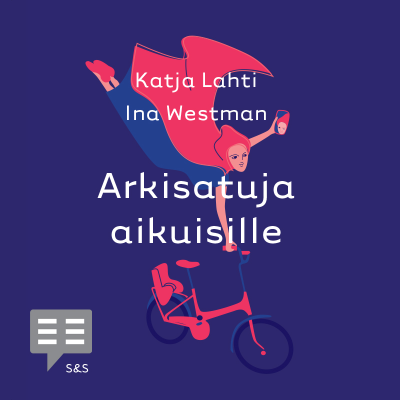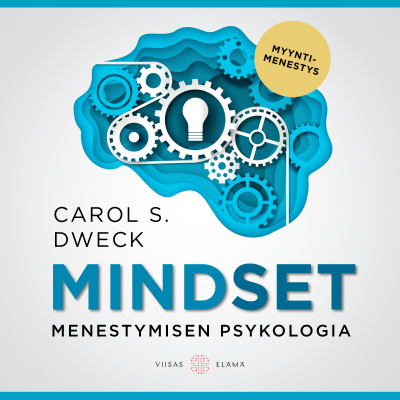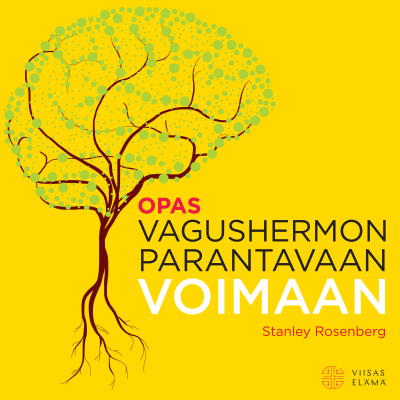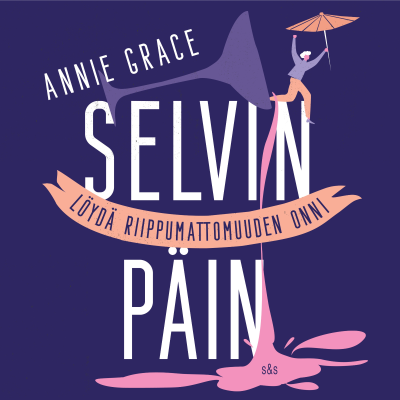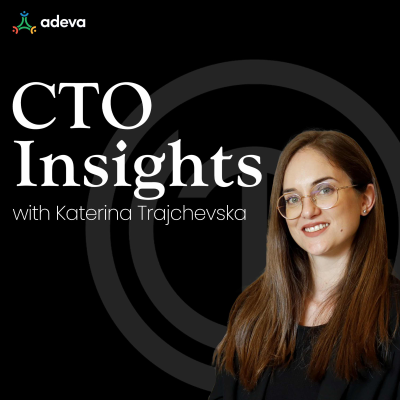
CTO Insights Podcast
englanti
Talous & ura
Rajoitettu tarjous
2 kuukautta hintaan 1 €
Sitten 7,99 € / kuukausiPeru milloin tahansa.
- Podimon podcastit
- Lataa offline-käyttöön
Lisää CTO Insights Podcast
CTO Insights is a podcast on engineering leadership that brings you insights from senior engineering leaders and experts on creating a culture of high performance. ctoinsights.adevait.com
Kaikki jaksot
21 jaksotUnpacking Continuous Delivery: Bryan Finster on Transforming Legacy Systems
In this episode of CTO Insights, Katerina is joined by Bryan Finster, co-creator of Minimum Viable Continuous Delivery (CD), to discuss implementing CD in legacy and enterprise environments. Bryan shares practical steps, the benefits of CD, and how to overcome challenges such as getting buy-in, improving test coverage, and dealing with legacy code. Learn how to drive progress without needing a complete rewrite and improve team morale and operational efficiency. Brought to you by Adeva, this episode is a must-watch for anyone struggling with slow manual releases. Subscribe for more insights on creating high-performing teams and standout products. 00:00 Introduction to CTO Insights 01:20 The Journey to Continuous Delivery 03:31 Challenges and Benefits of Continuous Delivery 05:40 Continuous Delivery in Different Contexts 07:44 Minimum Requirements for Continuous Delivery 12:48 Incremental Steps to Implement Continuous Delivery 18:39 Organizational Changes and Team Dynamics 22:32 Measuring the Impact of Continuous Delivery 26:09 Common Misconceptions About Continuous Delivery 30:08 Final Advice for CTOs and Engineering Leaders 32:50 Conclusion and Contact Information This is a public episode. If you would like to discuss this with other subscribers or get access to bonus episodes, visit ctoinsights.adevait.com [https://ctoinsights.adevait.com?utm_medium=podcast&utm_campaign=CTA_1]
The Roadmap as a Financial Plan: How to Drive Profitability as a CTO—with Farah Chabchoub, CTO at Worklife
In this episode of CTO Insights, Katerina is joined by Farah Chabchoub, CTO at Worklife, to discuss the strategies for transitioning from a growth-driven model to a profitable and sustainable tech company. Farah shares her experiences aiding late-stage startups in building resilient organizations by transforming the development focus towards financial planning. They delve into topics such as budgeting, aligning with board members, and balancing quick feature delivery with long-term company health. The conversation also touches on how to manage team dynamics during significant transitions like acquisitions, laying off underperforming projects, and building ambitious yet budget-conscious roadmaps. Sponsored by Adeva, the episode offers valuable insights for engineering leaders facing high-burn environments. 00:00 Introduction and Episode Overview 01:11 Joining Post Series C: Challenges and Fixes 02:27 EBITDA Positive: A CTO's Unique Goal 05:35 First Steps in a New Company 10:20 Aligning Product Roadmap with Financial Plan 16:20 AI and Product Development 17:49 The Cost of Poor Planning 21:57 Managing Team and Stakeholders During Tough Decisions 31:55 Mindset Shifts for Sustainable Growth 34:42 Final Advice for Engineering Leaders 35:46 Conclusion and Farewell This is a public episode. If you would like to discuss this with other subscribers or get access to bonus episodes, visit ctoinsights.adevait.com [https://ctoinsights.adevait.com?utm_medium=podcast&utm_campaign=CTA_1]
From 6-month Releases to Release Whenever—with Egil Osthus, CEO at Unleash
In this episode, Egil Osthus, CEO and co-founder of Unleash, joins Katerina to talk about how enterprise teams can move away from rigid, high-risk release cycles to safer, faster, and more iterative delivery. Egil shares how he led a 500-person engineering org from quarterly (and even yearly) releases to a deploy-whenever model—despite legal constraints, stakeholder objections, and legacy systems. They talk through the real-world playbook: how to manage stakeholder expectations, start small, build trust, and keep momentum with early wins. From feature flags to feedback loops, this episode is packed with practical strategies for engineering leaders who want to modernize release processes without triggering chaos. What You’ll Learn - How to shift from long release cycles to frequent, low-risk deployments - Why stakeholder alignment is more important than technical tooling - How to introduce change without triggering resistance - Practical strategies for starting small and building trust across the org - The role of feature management in enabling safer, iterative delivery - How better feedback loops can improve product direction and team focus - Why most developers already know this is the right way—and what’s still blocking them - How to win over skeptics by reframing big changes as small experiments - What leaders often get wrong about risk in modern release strategies Egil Osthus is the CEO and co-founder of Unleash, an open-source feature management platform used by enterprises to ship software faster and safer. He’s an experienced engineering leader with a background in developer tools, large-scale software delivery, and organizational transformation. Before starting Unleash, Egil held multiple leadership roles at Visma, one of Europe’s largest SaaS companies, where he led product development across international teams and drove the transition from long release cycles to continuous delivery. This is a public episode. If you would like to discuss this with other subscribers or get access to bonus episodes, visit ctoinsights.adevait.com [https://ctoinsights.adevait.com?utm_medium=podcast&utm_campaign=CTA_1]
How DevEx and AI Shape Team Performance—with Laura Tacho, CTO at DX
In this episode, Laura Tacho joins Katerina to explore what really drives developer team performance. They dig into how to use self-reported and system data effectively, why metrics should never be used for individual performance, and how AI is changing developer workflows (and what it’s not doing yet). From scrappy startup practices to company-wide DevEx strategies, this episode is packed with practical ways to build healthier, higher-performing engineering teams. What You’ll Learn - How DX helps teams boost performance through developer intelligence - Why self-reported data can surface quick, actionable insights - What makes a developer survey actually useful — and how to get teams to respond - How to use system data to save time and streamline engineering workflows - Why developers already know where the friction is — and how to tap into it - How starting simple with metrics early on can build better habits as you grow - The risks of using metrics to judge individual performance — and how to avoid them - Where AI tools really stand today — more autocomplete than autonomous - How to let data guide your decisions when introducing AI tools This is a public episode. If you would like to discuss this with other subscribers or get access to bonus episodes, visit ctoinsights.adevait.com [https://ctoinsights.adevait.com?utm_medium=podcast&utm_campaign=CTA_1]
How Zapier Makes Learning the Key to Performance—with Mojtaba Hosseini, VP of Engineering at Zapier
Brought to you by: Adeva [https://adevait.com/] — Global network of top developers connecting businesses with world-class talent. In this episode of CTO Insights, Katerina Trajchevska is joined by Mojtaba Hosseini, VP of Engineering at Zapier, to explore how Zapier built a culture of strong customer focus, meaningful metrics, and long-term performance — and how they're using AI to drive real impact across the organization. What You’ll Learn - Why engineering is applied science in service of the customer - How customer focus shapes culture and drives engineering decisions - What “high performance” really means, and why it’s about the slope of learning - How Zapier built a team-driven approach to metrics over four years - What to measure—and what not to—when evaluating developer productivity - How engineering can support other teams in adopting AI - Why “always be learning” is a core engineering principle - How to build habits of sharing and experimentation across teams Mojtaba Hosseini is VP of Engineering at Zapier, where he’s spent the last several years building high-performing teams grounded in customer focus, data, and continuous learning. With a systems-thinking approach to leadership, Mojtaba has led Zapier’s engineering team through a four-year journey of defining meaningful metrics, shifting measurement from a top-down requirement to a team-driven habit. He’s been leading Zapier’s efforts to bring AI into day-to-day work—helping engineers work more efficiently and supporting other teams across the company. He combines deep technical experience with hands-on leadership to build engineering teams that scale with focus, clarity, and impact. If you enjoyed this episode, make sure to subscribe, rate, and review it on Apple Podcasts, Spotify and Youtube. This is a public episode. If you would like to discuss this with other subscribers or get access to bonus episodes, visit ctoinsights.adevait.com [https://ctoinsights.adevait.com?utm_medium=podcast&utm_campaign=CTA_1]
Valitse tilauksesi
Rajoitettu tarjous
Premium
Podimon podcastit
Lataa offline-käyttöön
Peru milloin tahansa
2 kuukautta hintaan 1 €
Sitten 7,99 € / kuukausi
Premium
20 tuntia äänikirjoja
Podimon podcastit
Lataa offline-käyttöön
Peru milloin tahansa
30 vrk ilmainen kokeilu
Sitten 9,99 € / kuukausi
Premium
100 tuntia äänikirjoja
Podimon podcastit
Lataa offline-käyttöön
Peru milloin tahansa
30 vrk ilmainen kokeilu
Sitten 19,99 € / kuukausi
2 kuukautta hintaan 1 €. Sitten 7,99 € / kuukausi. Peru milloin tahansa.



















